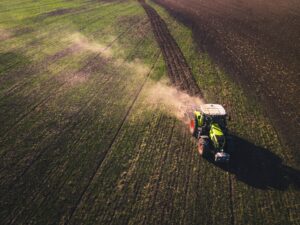
By Amber Bereznyckyj, History and Creative Writing student at the New College of the Humanities
Article 39 of the Treaty of Rome (1957) set out what was to be expected of the UK’s agricultural policy. This was to maintain regular supplies to consumers at reasonable prices, something which the UK’s farming community has always fought against because cheaper food systems in Europe have consistently undercut British agriculture. Today, over a quarter of our food stuffs is imported from Europe as only half of the UK’s overall demand is met domestically. Traditionally, our agricultural industry has relied on the meat and poultry industries, even resorting to importing grain when livestock was prioritised over cereals during bad weather. Before the pandemic; the government saw the UK’s biggest export being beverages, in particular Scotch Whiskey.
Importation expenditure has doubled since 2000 and food security is in a dangerous decline, as seen through the panic buying at the start of the pandemic and increased austerity for those in the service industry and local businesses. This leaves us with an important question: How easily could the UK deal with our globalised food system being dismantled, and if so, would this be more environmentally friendly?
Theoretically, this would make it more environmentally friendly, given that cutting out middle men would help reduce packaging, transport costs and the cost of running each production warehouse, all helping to reduce CO2 emissions. The new found ‘slow food’ systems and community gardens arguably succeed in providing for their local communities, embracing education as the way forward. The issue with a globalised system is that it disconnects us from how food is grown. Our biggest import is fruit and vegetables, worth £11.5 Bn, despite regional scale growth being possible, evidenced by the emergence of Dr Carrot during World War Two. However, agricultural development is a long-term process which requires annual plans and so if a crisis was to emerge again – it would not be so easy to recover.
Alternatively, the pandemic may benefit the globalised food system because it has ensured better hygiene precautions at every stage; reducing the risk of contamination. 1 There is an argument to support the idea that further centralisation is the answer alongside improving technology. Perhaps this isn’t the time to return to localised growth but rather adapt the current system we have, particularly given some countries run naturally low on certain resources, such as China’s water shortage. This indicates that the greatest challenge to agriculture will always be landscapes. However, one only has to look at the more traditional indigenous food systems to reach a solution. There have been many examples of globalised agriculture causing irreversible damage to natural food systems. In Haiti, people were encouraged to move away from their natural food systems and adopt western canned goods due to American lobbying, ultimately underselling community farming and their more traditional food systems which broke down as a result. This meant they became dependent on the globalised system and disconnected from their traditional food stuff which has now become too expensive for the working class. The consequence of this has been a decline in the general health of the population and the environment.

Perhaps adapting centralised food systems to work with natural food systems rather than against them would allow the global system to become more efficient. Given how fast our technology is advancing, we could find emissions slashed and a more stable market. Especially on the issue of food waste, a more efficient centralised system could see food waste being appropriately rationed to lower income families and the homeless. Localised systems may also be unable to cope as well with the cost of hygiene precautions; without which such community farms could see detrimental food shortages and even illnesses in regional areas. Centralised systems can deal with these scenarios in a much more efficient manner.
On the other hand; localised agriculture still has a valid role, the most interesting example being large-scale Community-supported agriculture (CSAs) in America. 2 They take advantage of indigenous food systems, basing their production on neighbourhood demand rather than greatest profit. They are surprisingly economical as well and great for the environment. ‘A Study of Commonwealth Food Production’ in Massachusetts (1982) by Radha Sinha found that the consumer paid 53% less than retail value through buying shares in CSAs. 3 Coupled with Sir Joseph Hutchinson’s research on how farmers only get 7% of their products’ income versus 45% fifty years ago – it is clear that the globalised system may not be the best for the everyday man but rather the corporate sector. 4
On the other hand, it is unlikely that the service and transport jobs involved in centralised foods supplies could be compensated by agricultural jobs. These skills are not easily transferrable and the general population would not necessarily prioritise the positive impact of reducing our consumerist lifestyle. While those on lower incomes could benefit from cheaper, local produce over processed foods, the popularisation of organic food as a luxury rather than a necessity has only raised the value and subsequent price of local food production, making it more financially inaccessible.
Realistically, the system we have now is unlikely to change because of the global trade links that ensure we provide the necessities for each other. However, providing for demand and not profit would be sufficient enough to curve the detrimental effect our centralised system has, including a more efficient use of food waste. Additionally, it would be beneficial to see a more large-scale campaign towards accessible food sources, particularly in those regional areas that could benefit from more skilled jobs and community work. In short, do we bring back Dr Carrot?
References:
(1) – ‘Some Benefits and Drawbacks of Local Food Systems’, Jules Pretty, Professor of Environment and Society, University of Essex Briefing Note for TVU/Sustain AgriFood Network, 2001
(2) – ‘Global Food, Global Justice: Essays on Eating under Globalization’. Edited by M. Rawlinson & C. Ward, Cambridge Scholars Publishing, 2015, 143-56
(3) – ‘A Study of Commonwealth Food Production’, Commonwealth Secretariat, Radha Sinha, University of London, Institute of Commonwealth Studies, 1982
(4) – ‘Population and Food Supply’, Sir Joseph Hutchinson, Cambridge University Press, 1969